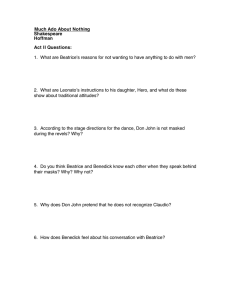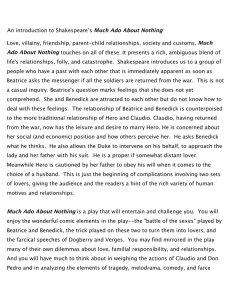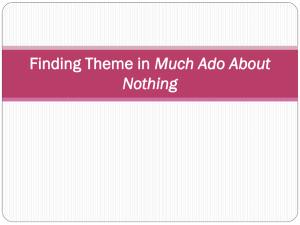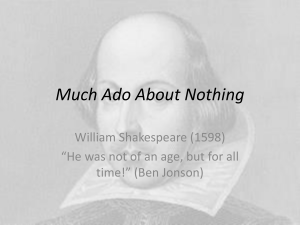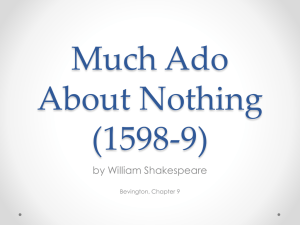Research Paper Prompts.doc
advertisement
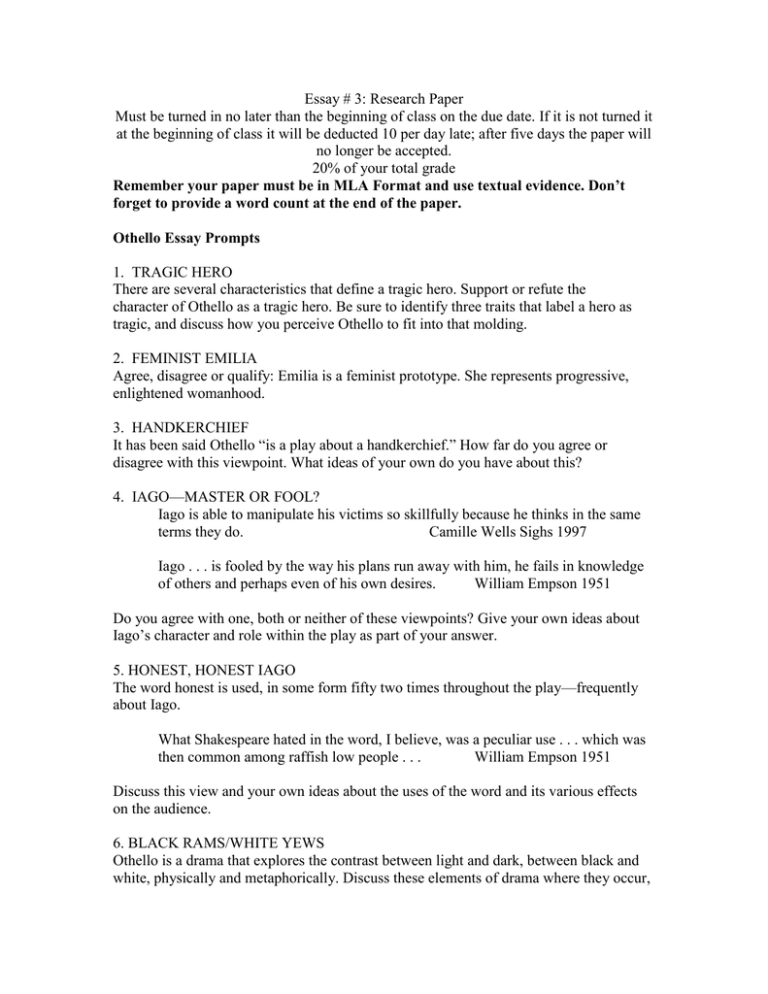
Essay # 3: Research Paper Must be turned in no later than the beginning of class on the due date. If it is not turned it at the beginning of class it will be deducted 10 per day late; after five days the paper will no longer be accepted. 20% of your total grade Remember your paper must be in MLA Format and use textual evidence. Don’t forget to provide a word count at the end of the paper. Othello Essay Prompts 1. TRAGIC HERO There are several characteristics that define a tragic hero. Support or refute the character of Othello as a tragic hero. Be sure to identify three traits that label a hero as tragic, and discuss how you perceive Othello to fit into that molding. 2. FEMINIST EMILIA Agree, disagree or qualify: Emilia is a feminist prototype. She represents progressive, enlightened womanhood. 3. HANDKERCHIEF It has been said Othello “is a play about a handkerchief.” How far do you agree or disagree with this viewpoint. What ideas of your own do you have about this? 4. IAGO—MASTER OR FOOL? Iago is able to manipulate his victims so skillfully because he thinks in the same terms they do. Camille Wells Sighs 1997 Iago . . . is fooled by the way his plans run away with him, he fails in knowledge of others and perhaps even of his own desires. William Empson 1951 Do you agree with one, both or neither of these viewpoints? Give your own ideas about Iago’s character and role within the play as part of your answer. 5. HONEST, HONEST IAGO The word honest is used, in some form fifty two times throughout the play—frequently about Iago. What Shakespeare hated in the word, I believe, was a peculiar use . . . which was then common among raffish low people . . . William Empson 1951 Discuss this view and your own ideas about the uses of the word and its various effects on the audience. 6. BLACK RAMS/WHITE YEWS Othello is a drama that explores the contrast between light and dark, between black and white, physically and metaphorically. Discuss these elements of drama where they occur, who or what they apply to, and what the audience learns about human nature and prejudice. 7. DESDEMONA’S DEFENDER As Desdemona’s confidante and staunch defender, Emilia emerges at the end of the drama as a tragic heroine. How and to what extent do you agree or disagree with this statement. 8. STRONG DESDEMONA Agree, disagree, or qualify: Desdemona is not a wimp. She is soldier’s wife and fit to be so. She has good sense, stubbornness, and courage. She can stand up to Othello for the sake of what she thinks right, even when he is in a dangerous mood and few people would care to face him. Much Ado About Nothing 1. THE FUNCTION OF DECEIT A central theme in the play is trickery or deceit, whether for good or evil purposes. Counterfeiting, or concealing one’s true feelings, is part of this theme. Good characters as well as evil ones engage in deceit as they attempt to conceal their feelings: Beatrice and Benedick mask their feelings for one another with bitter insults, Don John spies on Claudio and Hero. Who hides and what is hidden? How does deceit function in the world of the play, and how does it help the play comment on life in general? 2. THE VIOLENCE OF LANGUAGE Language in Much Ado About Nothing often takes the form of brutality and violence. “She speaks poniards, and every word stabs,” complains Benedick of Beatrice (Act Two Scene One, line 216). Find examples of speech and words representing wounds and battles in the play. What do Shakespeare and his cast of characters accomplish by metaphorically turning words into weapons? What does the over-use of all this violent language signify in the play and the world outside it? 3. EXAMINING DON PEDRO In some ways, Don Pedro is the most elusive character in the play. He never explains his motivations—for wooing Hero for Claudio, for believing Don John’s lie, even for setting up Beatrice and Benedick. He also seems to have no romantic interest of his own, though, at the end of the play, without a future wife, he is melancholy. Investigate Don Pedro’s character, imagine the different ways in which he could be portrayed, and ascribe to him the motivations that you believe make him act as he does. Why is he so melancholy? Why does he woo Hero for Claudio? Is he joking when he proposes to Beatrice, or is he sincere? Why would Shakespeare create a character like Don Pedro for his comedy about romantic misunderstandings? 4. MALE & FEMALE HONOR In this play, accusations of unchaste and untrustworthy behavior can be just as damaging to a woman’s honor as such behavior itself. Is the same true for the males in the play? How is a man’s honor affected by accusations of untrustworthiness or unfaithfulness? Do sexual fidelity and innocence fit into the picture in the same way for men as it does for women? Examine the question of honor and fidelity as it relates to four male characters in the play: Benedick, Leonato, Claudio, and Don Pedro. What could Shakespeare be saying about the difference between male and female honor? 5. SHAKEPEARE’S POINT OF VIEW Each of Shakespeare’s plays contains some of his own point of view or prejudices on the subjects and themes. In Much Ado About Nothing, discuss (using examples from the play) how Shakespeare allows his own point of view enter into his writing and his characterizations. 6. FEMINISM DEFEATED? Discusses the idea that from the standpoint of a modern feminist sensibility, Beatrice and Hero's acceptance of marriage can be interpreted in a highly negative light. 7. LOVE STORIES Shakespeare interweaves two love stories in Much Ado About Nothing: the Claudio-Hero plot and the Benedick-Beatrice plot. Write an analytical essay on the ways in which they parallel or counterpoint each other in characterization, in dialogue, and in plot structure. 8. APPEARANCE VS. REALITY Appearance versus reality is the major theme in Much Ado About Nothing and the lesson of the play is to learn to discriminate properly and to estimate everything at its true value. Write an analytical essay on mistakes/mis-notings that take place in this play, as well as the way in which they are resolved; include the motifs, imagery, dialogue, and theatrical devices that Shakespeare employs to explore this theme. 9. THE IDEAL COUPLE? Are Beatrice and Benedick an ideal couple? Is the fact they are roughly equal in wit and intelligence significant? Do you find their attitude toward love and their courtship more satisfying than Claudio and Hero's? Why or why not? 10. CHARACTER STUDIES Discuss the character of Beatrice and/or Benedick. Is Benedick 'less than a man' because he abandons his male friends? Is Beatrice a harsh woman or a shrew because she is not obviously submissive? In what ways do Beatrice and Benedick challenge traditional sex roles? Is the challenge a healthy one?
